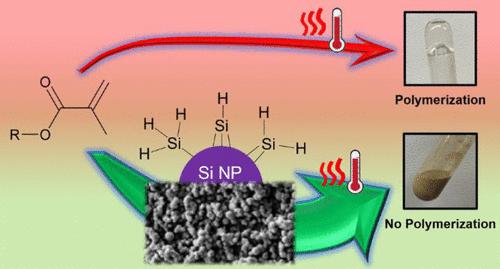Our official English website, www.x-mol.net, welcomes your
feedback! (Note: you will need to create a separate account there.)
Si–H Surface Groups Inhibit Methacrylic Polymerization: Thermal Hydrosilylation of Allyl Methacrylate with Silicon Nanoparticles
Langmuir ( IF 3.7 ) Pub Date : 2022-06-10 , DOI: 10.1021/acs.langmuir.2c00891 Pooria Golvari , Khaled Alkameh , Stephen M. Kuebler
Langmuir ( IF 3.7 ) Pub Date : 2022-06-10 , DOI: 10.1021/acs.langmuir.2c00891 Pooria Golvari , Khaled Alkameh , Stephen M. Kuebler

|
Hydrogen-terminated silicon nanoparticles (H–SiNPs) inhibit anerobic thermal autopolymerization of methacrylates. When heated to 100 °C under an inert atmosphere, allyl methacrylate (AMA) was stable for at least 95 h in the presence of 1.2 wt % H–SiNPs, exhibiting less than 0.15% conversion, whereas the neat monomer solidified within 24 h (over 10% conversion after 34 h). A mechanism is proposed that is based on H-transfer from SiNPs to the thermally activated methacrylic dimer biradical, quenching autopolymerization. An analysis of SiNPs isolated after heating in AMA reveals the grafting of ester groups. Thermal hydrosilylation offers a facile way to attach an allyl group to the surface of SiNPs.
中文翻译:

Si-H 表面基团抑制甲基丙烯酸聚合:甲基丙烯酸烯丙酯与硅纳米颗粒的热氢化硅烷化
端氢硅纳米粒子 (H-SiNPs) 抑制甲基丙烯酸酯的厌氧热自聚合。当在惰性气氛下加热至 100 °C 时,甲基丙烯酸烯丙酯 (AMA) 在 1.2 wt% H-SiNPs 存在下至少稳定 95 小时,转化率低于 0.15%,而纯单体在 24 小时内固化。 34 小时后转化率超过 10%)。提出了一种机制,该机制基于从 SiNPs 到热活化的甲基丙烯酸二聚体双自由基的 H 转移,猝灭自聚合。在 AMA 中加热后分离的 SiNP 的分析揭示了酯基团的接枝。热氢化硅烷化提供了一种将烯丙基连接到 SiNPs 表面的简便方法。
更新日期:2022-06-10
中文翻译:

Si-H 表面基团抑制甲基丙烯酸聚合:甲基丙烯酸烯丙酯与硅纳米颗粒的热氢化硅烷化
端氢硅纳米粒子 (H-SiNPs) 抑制甲基丙烯酸酯的厌氧热自聚合。当在惰性气氛下加热至 100 °C 时,甲基丙烯酸烯丙酯 (AMA) 在 1.2 wt% H-SiNPs 存在下至少稳定 95 小时,转化率低于 0.15%,而纯单体在 24 小时内固化。 34 小时后转化率超过 10%)。提出了一种机制,该机制基于从 SiNPs 到热活化的甲基丙烯酸二聚体双自由基的 H 转移,猝灭自聚合。在 AMA 中加热后分离的 SiNP 的分析揭示了酯基团的接枝。热氢化硅烷化提供了一种将烯丙基连接到 SiNPs 表面的简便方法。











































 京公网安备 11010802027423号
京公网安备 11010802027423号